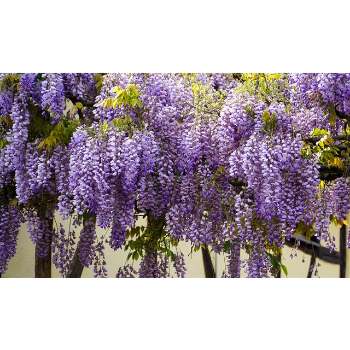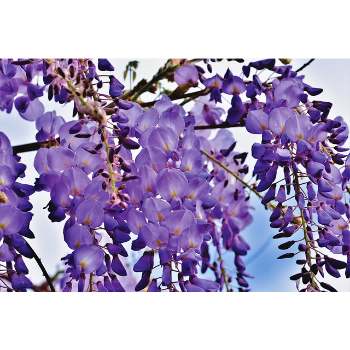Depending on the type, the smell of wisteria can be anything from musky to sweet, mild to strong frangance and sometimes like a lilacs. Some people say it smells like rose or flower, while others say it smells like spices, cloves, and damp rain.
Wisteria scents often fall into one of two categories: musky or sweet. A musky, exotic, and somewhat pungent aroma has been compared to certain wisteria kinds. This smell has a musky quality that may make you think of certain earthy oriental fragrances. Some people find the aroma to be interesting and have likened it to other fragrant flowers like tuberose.
On the other hand, certain wisteria cultivars have a soft, alluring aroma that is pleasant and fragrant. Their aroma’s sweetness may range from being light and understated to being overpowering. This sweetness is sometimes compared to the alluring aromas of lilacs or peonies, which are prized for their powerful and seductive aroma.
It’s crucial to understand that not all wisteria blooms have the same perfume, and that each person’s tastes greatly influence how they experience these aromas. While some people could find the wisteria’s sweet perfume to be wonderful and uplifting, others would be more likely to find the musky overtones to be appealing for their singularity.
Furthermore, the perfume of wisteria has the potential to have subtly nuanced undertones. Some people have detected notes of cloves and spices, which may give the wisteria aroma a hospitable and pleasant quality. Some people also pick up on undertones of damp rain, which adds to the sensory experience of being close to these blooms.
Understanding The Fragrance Of Wisteria
Wisteria has a pleasant and unique fragrance, which can be described as a combination of sweet peas and vanilla jasmine. Different varieties of Wisteria release different fragrances that vary in intensity from mild to overwhelming.
Wisteria’s scent: A delicate blend of sweet pea and vanilla jasmine
- Wisteria has a fragrance that is as enchanting as its appearance. It’s a unique blend of sweet pea and vanilla jasmine, creating a delicate and captivating aroma.
- The scent of wisteria is difficult to describe accurately, as it is a combination of various floral notes. It’s something that needs to be experienced firsthand to truly appreciate its beauty.
How The Fragrance Varies Among Different Varieties Of Wisteria
- Wisteria is not only beautiful in its different forms but also varies in fragrance among different varieties.
- The most fragrant cultivars of wisteria include Wisteria brachybotrys ‘Murasaki Kapitan’ and Wisteria brachybotrys ‘Shiro Kapitan’.
- These cultivars release a very sweet and captivating fragrance, making them highly sought after by garden enthusiasts.
Exploring The Range From Mild To Overwhelming Scents
- Wisteria, like any flower, exhibits a range of fragrances, from mild to overwhelming. This diversity offers options for various preferences and settings.
- For those who prefer a subtle fragrance, there are wisteria varieties that emit a milder scent, allowing for a more understated presence in gardens or indoor arrangements.
- On the other hand, for those who enjoy a more intense and powerful floral aroma, there are wisteria varieties that release an overwhelming scent, filling the air with their captivating fragrance.
Remember, the fragrance of wisteria is subjective and can vary depending on personal preferences and environmental factors. It is always a good idea to experience the scent of wisteria firsthand to fully appreciate its unique and captivating aroma.
The Most Fragrant Cultivars Of Wisteria
The most fragrant cultivars of Wisteria, such as Wisteria brachybotrys ‘Murasaki Kapitan’ and Wisteria brachybotyrs ‘Shiro Kapitan’, release sweet and captivating scents. Each variety has its own unique fragrance, ranging from mild to overwhelming.
If you’re wondering what wisteria smells like, you’re in for a treat. This beautiful flowering vine is not only visually captivating but also fragrant. Different cultivars of wisteria release varying scents, ranging from mild to overwhelming. In this section, we’ll uncover the secrets behind two highly fragrant cultivars: Wisteria brachybotrys ‘Murasaki Kapitan’ and Wisteria brachybotyrs ‘Shiro Kapitan’.
Let’s dive in and explore their delightful aromas.
Wisteria Brachybotrys ‘Murasaki Kapitan’: A Sweet And Intoxicating Fragrance
- This cultivar of wisteria emits a wonderfully sweet scent that is sure to captivate your senses.
- The fragrance of Wisteria brachybotrys ‘Murasaki Kapitan’ resembles a mesmerizing blend of sweet pea and vanilla jasmine.
- Its intoxicating aroma fills the air, creating a soothing and enchanting atmosphere in your garden.
- The scent of ‘Murasaki Kapitan’ is both delicate and refreshing, making it a popular choice for those who love floral fragrances.
- This cultivar is known for its compact growth habit and stunning purple flowers, making it a visually appealing addition to any garden.
Wisteria Brachybotyrs ‘Shiro Kapitan’: A Delightful And Captivating Aroma
- The ‘Shiro Kapitan’ cultivar of wisteria boasts a delightful fragrance that is sure to charm you.
- The aroma of Wisteria brachybotyrs ‘Shiro Kapitan’ is difficult to describe but can be likened to a captivating blend of sweet pea and jasmine.
- Its enchanting scent adds a touch of elegance and romance to your outdoor space, making it a favorite among wisteria enthusiasts.
- The fragrance of ‘Shiro Kapitan’ is both delicate and invigorating, creating a calming and blissful environment in your garden.
- With its cascading clusters of white flowers, Wisteria brachybotyrs ‘Shiro Kapitan’ not only adds beauty but also fills the air with its captivating aroma.
Now that you know about these highly fragrant wisteria cultivars, you can choose the one that best suits your preferences and create a scented oasis in your own backyard. Whether you opt for the sweet and intoxicating fragrance of ‘Murasaki Kapitan’ or the delightful aroma of ‘Shiro Kapitan’, wisteria is sure to add a touch of magic to your outdoor space.
Factors Affecting The Scent Of Wisteria
Wisterias have a pleasant scent, with different varieties releasing fragrances that range from mild to overpowering. The most fragrant cultivars include Wisteria brachybotrys ‘Murasaki Kapitan’ and Wisteria brachybotyrs ‘Shiro Kapitan’, which have a very sweet fragrance.
Wisteria is a beautiful flowering vine that not only adds visual appeal but also carries a delightful fragrance. The scent of wisteria can vary depending on several factors. Understanding these factors will help you appreciate the different aromas that wisteria can offer.
Let’s explore the environmental conditions, soil composition, sunlight, and proper care that affect the scent of wisteria.
Environmental Conditions And Their Impact On The Fragrance:
- Temperature: Wisteria tends to emit a stronger fragrance in warmer temperatures, as the scent molecules are more volatile.
- Humidity: Higher humidity levels can intensify the scent of wisteria, making it more noticeable and pleasant.
- Air Movement: Gentle breezes help carry the wisteria’s fragrance, allowing it to spread and fill the surrounding area.
Understanding How Soil Composition And Sunlight Affect The Scent:
- Soil pH: Wisterias thrive in slightly acidic to neutral soil. The acidity of the soil can influence the availability of certain nutrients, which in turn affects the intensity of the fragrance.
- Nutrients: Proper soil composition rich in organic matter and essential nutrients can enhance the scent of wisteria.
- Sunlight: Wisteria requires at least six hours of direct sunlight each day to produce optimal fragrance. Insufficient sunlight can result in weaker scents.
The Role Of Proper Care And Maintenance In Enhancing The Fragrance:
- Pruning: Regular pruning of wisteria promotes better air circulation and sunlight penetration, which can lead to stronger fragrance production.
- Fertilization: Using a balanced fertilizer specifically formulated for flowering plants can enhance the overall health of the wisteria vine, resulting in a more robust fragrance.
- Watering: Consistent watering, especially during periods of drought, helps maintain the plant’s health, ensuring it can produce a pleasant fragrance.
Understanding these factors that affect the scent of wisteria can deepen your appreciation for this beautiful flowering vine. By providing the right environmental conditions, soil composition, sunlight, and care, you can enjoy the intoxicating fragrance that wisteria has to offer.
Frequently Asked Questions For What Does Wisteria Smell Like
Does Wisteria Have A Nice Smell?
Yes, wisteria has a nice smell. Different varieties have different fragrances ranging from mild to overwhelming. The most fragrant cultivars are Wisteria brachybotrys ‘Murasaki Kapitan’ and Wisteria brachybotyrs ‘Shiro Kapitan’.
Does Wisteria Smell Like Jasmine?
Wisteria’s scent is hard to describe, but it’s similar to the fragrance of sweet pea and vanilla jasmine.
Is Wisteria Toxic To Humans?
Wisteria is toxic to humans, especially the pods and seeds. Ingesting even just two seeds can result in serious symptoms such as oral burning, stomach pain, diarrhea, and vomiting.
What You Need To Know About Wisteria?
Wisteria is a scented plant, but different varieties have different fragrances ranging from mild to overwhelming. The most fragrant cultivars are Wisteria brachybotrys ‘Murasaki Kapitan’ and ‘Shiro Kapitan’. All parts of the wisteria plant are considered toxic, especially the pods and seeds.
The plant can emit a sweet scent, similar to sweet pea or vanilla jasmine. Some people describe wisteria’s fragrance as difficult to describe but pleasant.
Conclusion
Wisteria is not only visually stunning but also has a captivating fragrance that adds an enchanting element to any garden or outdoor space. While all varieties of wisteria have a scent, the fragrances can vary from mild to overwhelming. The most fragrant cultivars include Wisteria brachybotrys ‘Murasaki Kapitan’ and Wisteria brachybotyrs ‘Shiro Kapitan’, which have sweet and delicate aromas.
Some describe the scent of wisteria as a combination of sweet pea and vanilla jasmine, but it truly is an experience that should be enjoyed firsthand. It’s important to note that while wisteria is beautiful and fragrant, all parts of the plant, especially the pods and seeds, are considered toxic if ingested.
As with any plant, it’s crucial to be aware of its potential dangers. Create a lush and fragrant garden with wisteria, but always handle and grow it with caution.


